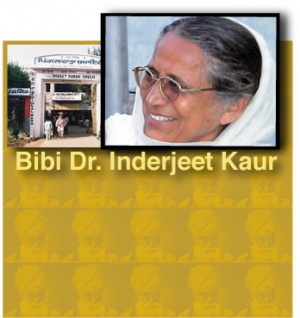Bibi Inderjit Kaur: Difference between revisions
Hari singh (talk | contribs) No edit summary |
Hari singh (talk | contribs) m (Bibi Dr. Inderjeet Kaur moved to Bibi Inderjit Kaur) |
(No difference)
| |
Revision as of 13:25, 19 December 2008
Bibi Dr. Inderjeet Kaur (Born January 25, 1942) is the daughter of Dr. Harbans Singh. She earned her Academic F.Sc. (Medical), in 1959 and her Professional M.B.B.S. from the Govt. Medical College of Patiala, Punjab, in 1967.
She worked as a P.C.M.S. Doctor under the control of the Directorate of Health Services, Punjab from 1967 to 1973 and has run her own private nursing /maternity home in in Sangrur, Punjab since 1973.
A professional Member of the Indian Medical Association she served as the Vice President of the 'All India Pingalwara Society of Amritsar, from 1988-1992 working with Bhagat Puran Singh. Upon the death of Bhagat Puran Singh she became the President of he Pingalwara Society in 1992.
On January 25, 2008, she was awarded the 'Padma Bhushan', the country’s third highest civilian award, in recognition of her social service.
The word Pingalwara means a house or asylum for the disabled, handicapped or crippled.
Ramji Das, who, for fourteen long years, carried a handicapped child on his shoulders as they had no place to stay later became known as Bhagat Puran Singh, after becoming a Sikh. He started the Pingalwara Society which has become a household name among Sikhs because of the extraordinary humanitarian work of the man who began collecting the deserted and downtrodden of society more than 80 years ago.
Other Achievements of Dr. Kaur
- Member/Trustee. Improvement Trust Sangrur from 1976-81
- Vice President, Indo-Soviet Cultural Society from 1977-81
- Member, Child Welfare Society, Punjab from 1987-88.
- Member, Sant Harchand Singh Longowal Memorial Committee since 1945 till date.
- Member, All India Pingalwara Society Reg. Amritsar 1987-88.
- Vice President, All India Pingalwara Society Reg. Amritsar, from 1988-1992.
- Patron President, All India Pingalwara Society, Reg. since August 15,1992 till date.
- During the devastating floods of Punjab in 1988 collected money for the specific purpose and distributed relief among the needy and the affected people, also motivated the people in general and the youth in particular to come forward to give relief and solace to the people in distress.
- During the disastrous earthquake in Lattir (Maharashtra) in 1993, took truck load of food stuff, clothes, blankets, and medicines and distributed it among the aggrieved and needy.
- As Patron President, All India Pingalwara Society, carried out the printing and free distribution of literature, including articles of eminent writers, to spread awareness among the masses regarding environmental degradation, drug, population explosion, deforestation, ruthless depletion of precious natural resources, like coal, iron ore, and other minerals, excessive use of petroleum products procured through investment of valuable foreign exchange.
- Committed to the upliftment of the downtrodden, the slum dwellers and homeless.
- Organising school facility for elementary education in slum area in Amritsar District.
In the news
Padma Bhushan: B’day gift for Pingalwara chief
The Tribune Amritsar, January 25, 2008
All-India Pingalwara Charitable Trust’s president Dr Inderjit Kaur (66) is going to be awarded with the prestigious Padma Bhushan for her work in the field of social service. Interestingly, the chief got the news on her birthday that is today.
Earlier, the founder of Pingalwara, Bhagat Puran Singh had received the Padam Shree but he returned the award in protest against the Blue Star operation.Talking to The Tribune, Dr Inderjit Kaur said the award was a result of the Trust’s team work. “I am delighted to hear the news,” she added.Popularly known as Bibi Ji, Inderjit came into contact with Bhagat Puran Singh in late 1960s and was made his successor. Dr Inderjit expanded the charitable trust and opened a branch at Mannanwala near Amritsar.
The Pingalwara provides shelter to 1,300 persons who are disabled, terminally ill, old or abandoned. Besides, it runs three schools where children from economically weaker sections are taught.

